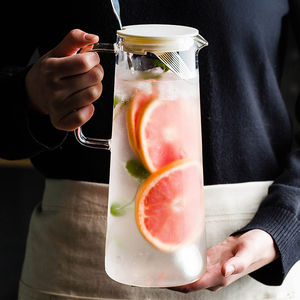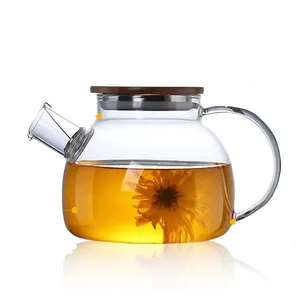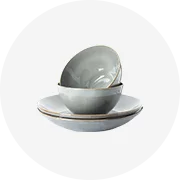Introduction
In an era where sustainability and health are paramount, the choices we make in our daily lives can have a profound impact. One such choice is the shift from plastic to glass, particularly when it comes to water storage. This article delves into the importance of sustainable living, the global issue of plastic pollution, and the benefits of choosing glass over plastic. We explore the advantages of glass water pitchers, their health and environmental benefits, aesthetic appeal, and durability. We also provide a comprehensive guide on choosing the right glass water pitcher and how to care for it, ensuring you make an informed decision for a healthier, more sustainable lifestyle.
The Importance of Sustainable Living
Living sustainably isn't just good for the planet but also your health. Adopting a more environmentally-friendly lifestyle can lead to numerous health benefits, including improved physical and mental health. By choosing products made from natural, non-toxic materials and avoiding harmful chemicals, you can reduce your exposure to toxins. Making environmentally-friendly choices like walking or biking instead of driving, using public transportation, and supporting clean energy sources, you can help to reduce air pollution and improve air quality in your community.
Understanding the Problem with Plastic
Plastic pollution is a global issue. Every day, the equivalent of 2,000 garbage trucks full of plastic are dumped into our oceans, rivers, and lakes. Annually, 19-23 million tonnes of plastic waste leaks into aquatic ecosystems, polluting our water bodies. This pollution alters habitats and natural processes, reducing ecosystems’ ability to adapt to climate change, and directly affecting millions of people’s livelihoods, food production capabilities, and social well-being. The environmental, social, economic, and health risks of plastics need to be assessed alongside other environmental stressors.
Why Choose Glass Over Plastic
Glass packaging has been a staple for over a century, used in various industries, including food, cosmetics, and pharmaceuticals. It protects sensitive products from external elements and offers a premium experience. The choice between glass and plastic packaging depends on the product and your brand story. Both have their advantages and disadvantages. However, glass is often preferred for its durability, aesthetic appeal, and ability to protect products from outside elements.
Benefits of Glass Water Pitchers
Glass water pitchers offer several benefits. Firstly, they are made of natural material and pose no harm to health, making them a safe choice. Secondly, they are durable and can withstand instant temperature changes. For instance, premium borosilicate glass pitchers can handle temperature changes from 30℃ to 150℃. Lastly, glass pitchers are aesthetically pleasing, adding elegance to any setting. However, they do have a fragility issue, but the production of Borosilicate glass has significantly improved their durability.
Health Benefits
Drinking water from glass bottles can significantly improve your health. Unlike plastic or metal bottles, glass bottles don't hold residual odours or tastes, ensuring you consume water free from contaminants. Glass bottles also maintain the freshness of the water throughout the day. Moreover, they can hold the water temperature, be it cold or hot, for a longer period of time. This means you can enjoy your beverages in their true flavour and colour. Switching to glass bottles is a step towards healthier hydration habits.
Environmental Benefits
Glass is often considered a more sustainable alternative to plastic due to its non-toxic properties and high recyclability. It can be infinitely recycled without impacting its quality, purity, or durability. Unlike plastics, which break down into harmful microplastics, glass is made of silica, a natural substance that doesn't cause environmental degradation. However, it's important to note that glass production can be energy-intensive and contribute to CO2 emissions. Despite this, the use of recycled glass in production can decrease energy consumption, making glass a viable option for those seeking sustainable solutions.
Aesthetic Appeal
Glass water pitchers are not just functional but also aesthetically pleasing. They feature clean, modern lines with a flared bowl and curved handle, adding a touch of elegance to any setting. Some even boast an elegant handle and pouring lip. These pitchers exemplify how glass water pitchers can enhance the visual appeal of your table setting or kitchen decor.
Durability and Longevity
Glass water pitchers have proven to be durable and long-lasting. They withstand high temperatures, making them safe for stovetop use. Their sturdy design ensures they don't crack easily, even when bumped against other containers. Some pitchers' cylindrical shape provides a better center of gravity, reducing the risk of tipping over. Despite their delicate shapes, these pitchers remained intact even when nearly tipped over. These pitchers not only offer durability but also longevity, as they are easy to clean and maintain.
How to Choose the Right Glass Water Pitcher
When choosing the right glass water pitcher, consider the type of glass material. Soda lime silicate glass and borosilicate glass are commonly used. Borosilicate glass, known for its durability and resistance to thermal change, is a popular choice. Also, consider the color of the pitcher. Avoid tinted glass due to potential health risks. The capacity of the pitcher should align with your needs. Lastly, consider the lid material. Glass and stainless steel are safer than plastic. Always buy from trusted sellers, especially when purchasing online.
Size and Capacity
When choosing a glass water pitcher, size and capacity are crucial factors to consider. The pitcher in question has a generous capacity of 80oz or 10 cups, making it suitable for both individual and family use. Its dimensions ensure it fits comfortably in most fridge doors or shelves. The pitcher features a reservoir for tap water and a lower reservoir for clean, filtered water. This design allows for a steady supply of filtered water, reducing the frequency of refills.
Design and Functionality
Some glass pitchers are a perfect blend of elegance and practicality. Their Scandinavian design adds a unique touch to your table. The pitcher features a precise scale line for accurate drink preparation and a stainless steel filter lid for easy pouring. The anti-drip spout and extra-wide mouth make it easy to clean. It's made of heat-resistant borosilicate glass, making it suitable for both cold and hot drinks. The thickened handle provides a comfortable and non-slip grip. The pitcher's large capacity makes it ideal for daily use or serving at parties.
Price and Quality
When considering the price and quality of glass water pitchers, it's important to factor in the cost of maintenance. For instance, some water filter pitchers require frequent filter changes, which can add to the overall cost. The quality of the pitcher also plays a role in its longevity and performance. High-quality pitchers are less likely to clog and can effectively remove contaminants from water. Therefore, while the initial cost might be higher, a quality glass water pitcher can be a cost-effective solution in the long run.
Care and Maintenance of Glass Water Pitchers
Maintaining the cleanliness of your glass water pitcher is crucial for its longevity and your health. Experts recommend washing it at least every week or two to prevent potentially illness-causing bacteria and other germs from building up. Ideally, you want to clean your water pitcher before you start seeing signs of build-up, like a slimy film. Always follow the manufacturer’s instructions on how to use the device and how to clean it to ensure its optimal performance and durability.
Conclusion
Embracing glass water pitchers is a significant step towards sustainable living and improved health. They offer numerous benefits, from their non-toxic nature and aesthetic appeal to their durability and longevity. Choosing the right glass water pitcher involves considering factors like the type of glass, color, capacity, and lid material. While the initial cost might be higher, the long-term benefits make it a cost-effective solution. Regular care and maintenance are crucial to ensure the longevity of the pitcher and your health. By making this simple switch, we can contribute to a healthier lifestyle and a cleaner planet, one pitcher at a time.






























 浙公网安备 33010002000092号
浙公网安备 33010002000092号 浙B2-20120091-4
浙B2-20120091-4